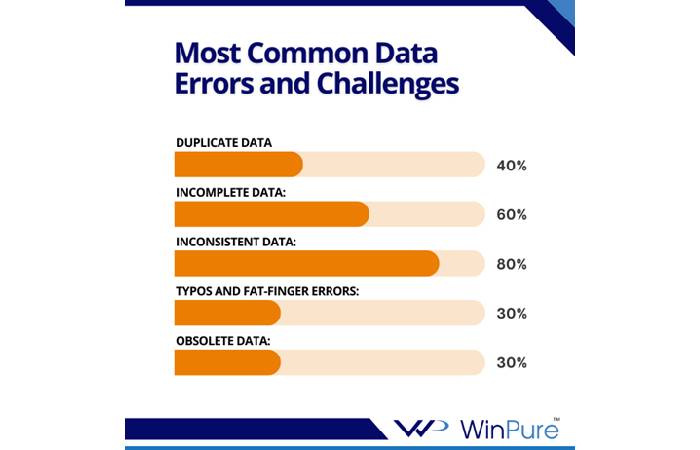Table of Contents
Introduction
Bad Data Can Affect Your Business – Data is the lifeline of any modern business. Companies generate and collect vast amounts of data every day from various sources. However, raw data, is never clean or reliable, no matter the guardrails that’ve been put in place to ensure optimal data collection. In order to use the data, it needs to be treated and common errors need to be resolved. Businesses that do not prioritize data quality cause data to become bad or dirty.
Bad data can negatively impact business operations, decision-making, and ultimately, the bottom line. In this post, we will explore the different ways bad data affects businesses and provide solutions for improving data quality, including data matching.
What is Bad Data?
Bad data refers to any data that is inaccurate, incomplete, or outdated. It can include missing information, incorrect formatting, duplicated records, and inconsistent data sets. Bad data can result from human error, system glitches, or other issues.
Regardless of its source, bad data can have serious consequences for businesses, including:

Common issues that contribute to bad data.
Poor Decision Making
Bad Data Can Affect Your Business – Bad data can mislead decision-makers, leading to poor decisions that can harm the business. If the data used for decision-making is incorrect, incomplete, or outdated, it can result in flawed conclusions and misguided actions.
For example, consider a business that relies on customer data to make decisions about marketing campaigns. If the data is inaccurate or incomplete, the business may target the wrong audience, resulting in wasted resources and lost revenue.
Increased Costs
Bad data can increase costs for businesses in several ways. For one, it can lead to wasted resources, as businesses may spend time and money trying to correct data errors. Additionally, bad data can result in inefficient processes, as employees may need to spend extra time verifying information.
Damaged Reputation
Bad data can damage a business’s reputation, as it can lead to poor customer experiences. If a business relies on inaccurate data to make decisions or communicate with customers, it can result in frustration and mistrust.
For example, consider a bank that sends a promotional email to a customer who has already signed up for the product being promoted. This could result in the customer feeling annoyed and frustrated, leading to a negative impression of the bank.
Compliance Risks
Bad data can also put businesses at risk of non-compliance with regulatory requirements. If businesses rely on inaccurate or incomplete data to comply with regulations, they may face fines or other penalties.
For example, consider a healthcare provider that relies on outdated patient data to make medical decisions. This could result in the provider failing to comply with regulatory requirements, potentially putting patients at risk and exposing the provider to legal action.
How Can You Improve Data Quality?
Improving data quality requires a proactive approach. Businesses can take several steps to improve data quality and mitigate the risks associated with bad data. These steps include:
Establish Data Governance
Data governance involves establishing policies, procedures, and guidelines for managing data. This can include guidelines for data entry, data processing, and data storage. By establishing data governance, businesses can ensure that data is accurate, complete, and consistent.
Invest in Data Quality Tools
There are many data quality tools available that can help businesses improve data quality. These tools can automate data cleansing, standardization, and validation, reducing the risk of errors and inconsistencies. A data matching solution can also be perfect when dealing with different databases that contain same information to make sure that you have one unified and clear database.
Conduct Regular Data Audits
Regular data audits can help businesses identify and correct data errors. By regularly reviewing data, businesses can identify patterns and trends in data quality, allowing them to address issues before they become serious problems.
Use a Code-Free Data Matching Solution
Data matching is a powerful tool for improving data quality. It involves identifying duplicate records in a dataset and merging them into a single record. By eliminating duplicates, businesses can reduce the risk of errors and inconsistencies in their data.
Data matching works by comparing data elements in a dataset and identifying records that match based on specific criteria. This can include comparing names, addresses, phone numbers, or other data elements. Once duplicate records are identified, businesses can merge them into a single record, reducing the risk of errors and inconsistencies
Ensure Data Security
Data security is an essential component of data quality. Businesses must protect their data from unauthorized access, theft, or loss. This can include implementing strong access controls, using encryption, and regularly backing up data. By ensuring data security, businesses can reduce the risk of data breaches that can compromise the accuracy and completeness of their data.
Train Employees on Data Management Best Practices
Employees play a crucial role in data quality. They are responsible for entering and managing data, and therefore must be trained on best practices for data management. This can include guidelines for data entry, data validation, and data protection. By investing in employee training, businesses can reduce the risk of human error and improve the accuracy and completeness of their data.
Conclusion
Bad Data Can Affect Your Business – In conclusion, bad data can have serious consequences for businesses, including poor decision-making, increased costs, damaged reputation, and compliance risks. However, businesses can take proactive steps to improve data quality, including establishing data governance, investing in data quality tools, conducting regular data audits, and using data matching.
By improving data quality, businesses can make better decisions, reduce costs, enhance customer experiences, and comply with regulatory requirements.
As data continues to play an increasingly important role in business operations, ensuring data quality will be critical to achieving success and maintaining a competitive advantage.

![Bad Data Can Affect Your Business: Tips to Improve [2025]](https://www.computertechreviews.com/wp-content/uploads/2023/02/Bad-Data-Affects-Your-Business-1200x675.webp)